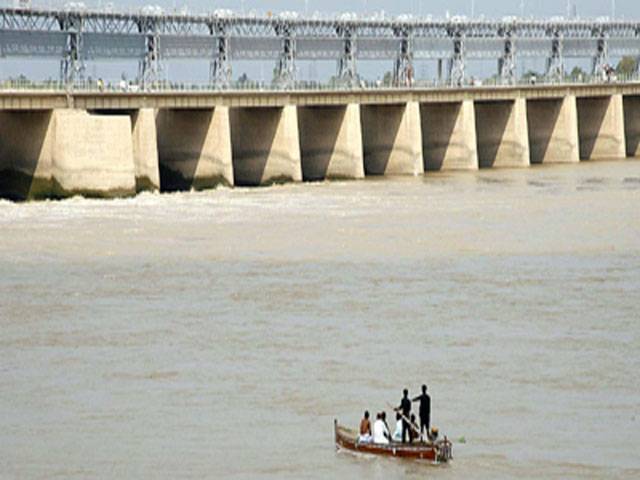KARACHI - After the failure of telemetry system launched during Musharraf regime, the Indus River System Authority has planned to initiate another project to ensure transparency in the distribution of water among the provinces, sources told The Nation on Monday.
IRSA, a constitutional body to distribute water of Indus River among the provinces on water accord 1991, in its meeting held four days ago in Islamabad decided to launch a project to build transparency and clarity in distribution of water resources among the provinces.
The representatives of provinces in IRSA attended the meeting and shared their input over the initiative, emphasizing that the fate of new project should not be like the telemetry system, which has been failed to give result on gauging/measuring the water at barrages.
“Out of 23 entrance sites of Indus Basin, five sites have been chosen as pilot project to gauge the actual availability and flow of water in the Indus River,” Salman Memon, Advisor to Irrigation Department of Sindh, who attended the meeting of IRSA in Islamabad, confirmed to The Nation, saying that all the four provinces have given their nod to the IRSA to initiate feasibility of new project. At total of Rs90 million would be spent on the feasibility of the project, which aimed at ensuring transparency in the distribution of water resources among the provinces, management of Indus Basin and to enhance capacity building of Indus River System Authority.
The initiation of the new scheme was agreed unanimously by all the stakeholders/provinces in IRSA meeting, vowing to contribute effectively in implementation of the scheme.
The IRSA would involve the irrigation departments of all the four provinces at all stages in the implementation process of the project. After lengthy discussion on the implementation strategy, the IRSA decided that all provincial Irrigation Departments would nominate a focal person by name for close liaison, coordination and implementation of the project.
According to officials, the project would include two main tasks-one is of River Flow Measurement at five sites as pilot project, and second Hydrological Modeling of Flow Forecasting of Upper Indus Basin (Upstream of Tarbela. The locations of proposed five sites are Chashma Barrage, Taunsa Barrage, Guddu Barrage, Garrang (Khirthar Canal) and Marala Barrge, which aiming to conduct pilot study to gauge the actual availability and release of flow of water at site.
Provinces have been alleging of water stealing against each other, so the mistrust is increasing among them.
The implementation of new project would help in the development of standardized water flow measurement system at the key points of the Indus Basin that will build trust and confidence amongst the stakeholders/provinces to improve accountability, transparency and efficiency of the water distribution, said Sindh Irrigation Department’s advisor Salman Memon.
According to the documents of IRSA which available with The Nation, the representatives from Khyber Pakhtunkhawa supported the implementation of the project, emphasising for using upgraded technology for flow measurement at all sites. KP representatives strongly suggested to upgrade and to rehabilitate the existing telemetry system with the latest equipment available in the market.
Director Regulation of Punjab Irrigation Department, Muhammad Hussain said that telemetry system had been failed due to defective design that resulted in the miscommunication of data. He, however, supported the new project for transparency in sharing of water between the provinces.
In the five sites identified for pilot project, the one site in KPK, two are in Punjab, one each for Sindh and Balochistan.
The mistrust between the Sindh and Punjab on water issue is not new as the Sindh province has been arguing that it was not receiving due share of water due to stealing of its water share by the Punjab. Besides, Balochistan has been alleging on the Sindh province that it was not releasing due share of water from Khirthar (Garrang Canal), resulting in mistrust between the two bordering federating units.
Friday, April 19, 2024
IRSA plans another project to ensure transparency

PTI founder’s interim bail extended in three cases
12:00 PM | April 19, 2024
US encourages Pakistan to prioritise and expand economic reforms
11:42 AM | April 19, 2024
Hafiz Naeem takes oath as JI chief, announces anti-government movement
11:39 AM | April 19, 2024
Faizabad commission report leaked, it should be made public now, suggests Abbasi
11:11 AM | April 19, 2024
A Tense Neighbourhood
April 19, 2024
Dubai Underwater
April 19, 2024
X Debate Continues
April 19, 2024
Hepatitis Challenge
April 18, 2024
IMF Predictions
April 18, 2024
Kite tragedy
April 19, 2024
Discipline dilemma
April 19, 2024
Urgent plea
April 19, 2024
Justice denied
April 18, 2024
AI dilemmas unveiled
April 18, 2024
ePaper - Nawaiwaqt
Advertisement
Nawaiwaqt Group | Copyright © 2024





